- Home
- Amanda Flower
The Final Vow Page 3
The Final Vow Read online
Page 3
Then I reminded myself that today was the anniversary of his family’s death. This wasn’t the day to become embroiled into an argument with my gardener.
He waved a piece of paper at me. “What is this?” He waved it again.
I grimaced. I’d hoped Shepley would never see that piece of paper. I rubbed my forehead, feeling a migraine forming just between my eyes.
I decided that playing dumb was the best tactic. “What do you have there?”
He crumbled the piece of computer paper in his hands and threw it at my feet. “Take a look at it for yourself.”
I stared at the piece of paper in the grass. There were so many things that were on the tip of my tongue as I stared at it, the most prominent being “You’re fired.” I took another deep breath—I found I was doing a lot of that lately—as I bent down and picked up the piece of paper. I smoothed it out on my thigh. I could feel Shepley grow more agitated by the second.
Finally I read the heading at the top of the paper. Directions for gardener for the Pumpernickle-Cambridge wedding. Number one on the list was Remove all plants that may attract insects.
I had to look at my shoes to hide my smile. My shoulders began to shake, which unfortunately gave me away.
“This is not funny.” Shepley glared at me with dark eyes that were barely visible, even when he wasn’t squinting, because of the many hours he’d worked in the sunlight. “I see nothing about this that is funny.”
I folded the piece of paper. “You have to admit, the fact that it says ‘remove all plants that attract insects’ is a little bit humorous.”
He scowled a little deeper, and I couldn’t see his eyes at all at that point. “Is it funny that that woman”—he pointed in the direction Vianna had just gone—“wants to put lights up in the church steeple? Yes, I overheard her telling you that. Do you think making changes to the church are funny? It’s just another example of how these people think they can do whatever they want to this Farm just because they have money.” He spat on the ground about a foot from my toe. “That’s what I think of all those people who donate money. Barton Farm doesn’t need them.”
His question sobered me up. “No, none of that’s funny,” I said.
When would I ever learn that Shepley had zero sense of humor? Was it any wonder that the two of us didn’t get along? And Shepley was wrong. Barton Farm did need donations like the one from the Pumpernickle family. All nonprofits needed donations. It was how we kept our doors open.
“So, why did you approve the plant removal?” His scowl deepened and his wrinkled skin seemed to fold farther into his face.
I chuckled, trying to calm him down. “I didn’t approve it. Vianna told me weeks ago that Krissie wanted this, and I said there’s no way we’re altering the gardens or any aspect of the village for the wedding. People who want to get married on the Farm have to want to because of what Barton Farm is, not what they wish it to be. Krissie and Eddie signed a contract. Vianna can’t make us do anything.”
Shepley pointed at the piece of folded paper in my hand. “It says right there that you approved this. You signed it.”
I opened the piece of paper again and noticed for the first time a handwritten note at the bottom with a very poor imitation of my signature. I felt my face grow hot. “I didn’t sign this.”
“That’s your signature,” he protested.
“That’s my name but not my signature. It’s not even close.” I tilted my head to the left. “Shepley, even you have to be able to recognize that’s not my signature. Whoever signed this left the second ‘e’ out of Kelsey. Do you really think that I would misspell my own name?”
He folded his arms. “Maybe you were in a rush when you signed it.”
“I’m telling you, I didn’t write it, agree to it, or sign it. Vianna shouldn’t have done this.” I folded the piece of paper a second time and stuck it in the back pocket of my jeans. “I had no idea she would go to such lengths to get what Krissie wanted for the wedding.”
I resolved to have a little talk with the wedding planner about this. How dare she give directions to my staff without my consent? How dare someone forge my signature? I could feel myself growing angrier by the second. “Just ignore this, Shepley. Act as if you never saw it.”
“How can I ignore it? It was in my mailbox in the visitor center.”
“If I really had approved it, it wouldn’t just be sitting in your mailbox. When have I ever told you to do something that way? I know you hardly ever check your mail. I always talk to you in person when I have a new project.”
He sniffed. “How am I to know what you’ll do when you make so many changes to the Farm? We were just fine here until you came along and started messing with things.”
Again, he was wrong. When I’d taken over the Farm, it was just months away from closing its doors forever. The previous director had been more concerned about preserving the history than the practical side of running a nonprofit. I’d brought the Farm back from the brink of ruin, with the help of Cynthia Cherry and her foundation, of course. I’d been the director now for four years. It was true that in that time, I’d made many changes to keep the Farm afloat, but I hadn’t made nearly as many as I’d planned. The Farm had so much potential. I wished Shepley could just see that instead of hating every little change or improvement that I made.
I didn’t say any of this to the gardener. It would be a waste of time and breath. He was happy living in his illusion of times being better in the good old days.
Shepley nodded, slightly less angry at least. “Yes, you usually do talk to me in person.” Then he scowled. “But why would I think of all that? You’ve been so preoccupied with this wedding. Because of that, many things have fallen to the wayside around the Farm. The staff has been talking about it.”
“What things?” It was my turn to scowl.
He frowned, but he didn’t answer. It didn’t matter. I would talk to Laura about it when she had a free moment. If anyone knew about grumblings happening on the village side of the Farm, it would be her. I was surprised she hadn’t said anything to me about it before now if it was really a problem, which told me that Shepley was most likely making much more of it than it was.
“I don’t change my gardens for anything,” he reiterated. “What’s in the garden is up to me and me alone.”
That wasn’t exactly true either. Ultimately, what happened on the Farm, including in the gardens, was up to the Cherry Foundation’s trustees. I wasn’t happy about the arrangement myself.
A thought occurred to me. “You got this list from your mailbox? What made you go into the visitor center and check your mailbox? You never go into the visitor center.”
Shepley crossed his arms. “I just happened to be passing through and saw it sticking out of my box.”
I couldn’t think of a single time that Shepley “happened to be passing through” the visitor center, especially in the middle of the season. He hated the visitor center, mostly because it was overrun with visitors, whom he hated.
My doubt must have been written all over my face because he said, “I’d be careful if I were you, Kelsey. If you’re not careful, you’ll lose control over more than this wedding.”
That made two threats within fifteen minutes of each other. In a way, I was impressed with myself. It was a new personal record.
five
By the time I made it to the visitor center, Hayden was already in the cafeteria. Judy sat across from him, in her proper blouse and long khaki skirt. The pair ate peanut butter and jelly and shared a bag of Oreos. I shivered to think how many of those cookies my son had downed in the time it took me to walk across the Farm.
I took a seat next to him. His soft brown hair was mussed, and there was dirt on his X-Men T-shirt and his khaki shorts. I didn’t bother to ask how he’d gotten his clothes dirty so quickly. He was a six-year-old boy. Six-year-old boys
were known to be dirt magnets.
I kissed him on the top of the head.
He beamed at me. “Hi Mom.”
My heart melted looking at that smiling face, especially now that one of his front teeth was missing. He’d lost it last week. Krissie had not been pleased that he’d lost a tooth this close to the wedding and wanted him to wear a flipper for the wedding photos. Thank God, even Eddie put his foot down about that.
Judy slid the bag of Oreos toward me. “You’re going to need these.”
I took two from the bag. I might not want Hayden to eat them, but I wasn’t immune to their chocolate comfort, and whenever Judy said I needed a cookie, I took it. Judy wasn’t one to push sugar unless it was an absolute emergency. “Was that kid getting sick to his stomach worse than we thought?” I asked.
She took a swig from her bottle of water. “No. Benji took care of it like a champ.” She held up her water bottle in salute to my assistant. “You might want to think about giving her a raise.”
“I think about that every day, and I would if I had the funds,” I said. Lack of funds was always my number one concern at Barton Farm. “So if that’s not the problem, what is?’
She adjusted one of the barrettes that held her silver hair out of her face. “I noticed something unusual in storage.”
“What do you mean, something unusual in storage?” I lowered my voice. We weren’t the only ones in the cafeteria. Families and day camp groups were starting to file in to eat their picnic lunches or purchase something from our snack counter in the back of the room.
Hayden pushed what was left of his PBJ aside and watched the campers.
Judy leaned in closer. “I went down there to look for the Christmas lanterns. You know, the ones that we use for the candlelight tours of the Farm in the winter?”
I nodded. The candlelight tours, which we’d hosted for the first time last December, had been very popular. We’d decorated all the buildings in the village in Christmas greenery. I hoped to do it again this Christmas. I popped an Oreo in my mouth.
“Krissie wants us to use them for the wedding reception,” Judy explained. She rolled her eyes. “Anyway, when I was down there, I noticed something was off.”
“Off? Off, how?” I asked, nearly choking on the Oreo lodged in my throat.
Hayden slid his water bottle across the table to me. He was a good son. I’d raised him right.
I downed half the water and repeated my question in a rasp.
Judy eyed me over her wire-rimmed glasses. “I think some things have gone missing.”
“What?” I asked.
Judy put the cap back on her bottle of water. “I don’t know for sure, but it just seems like things aren’t where they were, and some are missing. I don’t know what’s down there well enough to know what’s actually gone.”
I stood. “I need to go down there and check it out.”
“Mom, aren’t you going to eat lunch?” Hayden asked, staring up at me with his bright blue eyes.
I took two more Oreos from the bag. “These will work.”
Hayden frowned. “How come you can just have Oreos for lunch, and I can’t?”
I smiled at him. “It’s an age thing. When you’re over thirty, you can do it too.”
He gave a long-suffering sigh. “There are so many things I can’t do until after I’m thirty.”
As his mother, that sounded just fine to me.
The Barton Farm storage room was in the basement of the visitor center. The stairs, which led to the basement, were at the back of the cafeteria, off a small hallway by the kitchen. I opened the door to the stairwell, and Hayden and Judy followed me down the stairs.
The basement was unfinished, with gray cinderblock walls and a concrete floor, but it was cool and dry. It was the perfect place to store costumes and supplies for the Farm. The storage room was the first door on the right. It was twice the size of the lower floor of my cottage—maybe even twice the size of the cottage altogether, including the square footage of the second floor. The room’s size and cool temperature was all it had going for it, however, because unfortunately it was a mess. Metal racks of period clothing butted up against boxes of candlemaking wax and enormous containers of mustard, a donation from a local grocer that I’d regretfully accepted. We had more than enough mustard to survive the zombie apocalypse twice over.
Organizing the storage room was on the list of things that I needed to do at the Farm. I should have hired someone or paid one of my employees to do it a long time ago, but being the control freak that I am, I wanted to do it myself. Most of the things in storage were period replicas, but occasionally I’d run across a true artifact from the Barton family that had been misplaced. A volunteer or even most of my staffers wouldn’t be able to tell a replica from a real artifact. I could, and I didn’t want anything thrown away or lost that might have some historical ties to the Barton family and their life on the Farm.
It seemed I needed to make this room a priority, but after the wedding. Everything in my life lately was getting filed under “after the wedding.” The To Do list was growing quite long in my notebook.
“Mom, what’s this?” Hayden picked up a saber that thankfully was still in his sheath.
I took it from him and put it on a high shelf. “No knives or swords, okay?”
He sighed, as if I’d said that he wasn’t allowed to play with his iPad for a week.
“So what’s off?” I asked Judy as I glanced around the room. “This place is such a mess. How can you even tell that something is wrong?”
“It was the trunk that got my attention.” She pointed at the concrete floor. “See the dust. The trunk has been moved. Look how the dust has been disturbed.”
My eyes fell to where she pointed. Judy was right; the dust did look like it had been disturbed. I bit the inside of my lip. I didn’t have a good feeling about this. The trunk had to weigh at least 150 pounds and was a three-by-three-foot cube of iron. Why would anyone move it?
The trunk had been discovered during the renovation of the Barton House, when I first started at the Farm as museum director. That was four years ago. At the time, I’d been overwhelmed by the massive restoration. It was my responsibility to make sure the project went smoothly and was true to the historical integrity of the large brick house. At the same time, I’d been just getting my bearings in the insurmountable task of bringing Barton Farm back from ruin, so I’d ignored the trunk. But when Benji came on as my assistant, I asked her to inventory its contents. She did it in short order, documenting each piece and putting them into our artifact database. The trunk held some of our most valuable artifacts from the Barton family, and when I say valuable, I mean that most of the items’ value lay purely in the historical significance to the Bartons themselves and the region. Monetary value was not as important to me as the history of the artifacts and what they could tell us about daily life on the Farm.
Even with Benji’s careful cataloging, I had yet to come to a decision as to where to put the items, so here they and the trunk remained until I could make up my mind. The visitor center was the most secure place on the grounds, I figured. No one would walk out unnoticed with a trunk that heavy, and it was locked up tight to boot. The key was in my office. The trunk wasn’t hurting anyone or anything in storage. Deciding what to do with it and its contents could wait—or at least that’s what I thought. How wrong I’d been.
“We’d better open it to make sure that everything is there,” I said.
Judy stuck her hand into her pocket and came up with the small key. “I knew you were going to say that, so I’m already one step ahead of you. I took the liberty of grabbing this.”
I forced a smile. “I’d say you’re more than just one step ahead of me.” I took the key from her and knelt in front of the trunk. Hayden squatted beside me. I fit the key into the lock and it turned easily.
&nb
sp; Using the key was only one way to open the iron box. The top could also be opened by pulling on the many levers decorating the front of the trunk in the proper sequence. I never remembered the precise combination of levers to pull, so I was happy Judy had had the foresight to bring the key.
I opened the trunk and swore under my breath.
“Earmuffs, Hayden,” Judy ordered.
My son dutifully covered his ears with his small hands.
The trunk was empty. Completely empty. Not a scrap of cloth or a single dust bunny had been left behind.
I rocked back on my heels. “This is bad.” I felt sick to my stomach. One of my most important jobs as Director of Barton Farm was to preserve history. One of the ways to do that was to protect the Barton family’s possessions, and I’d failed miserably at that.
“Do you think it’s some type of mistake?” Judy asked. “Maybe someone took the artifacts out of the trunk for safekeeping or to inventory them?”
I looked up at her. “I would be the only one who would do that, or maybe Benji, but she would never do it without telling me.”
“Then say,” Judy began, “that someone took them. Would they be valuable? Could they make money from selling them?”
I stood up, my knees cracking as I moved. Hayden remained squatting in place, staring into the empty trunk. “Not much, not really. The real value of the things inside there was to the Farm. Why bother stealing them at all?”
Judy frowned.
I sighed. “I should have decided what to do with the artifacts years ago.”
She patted my arm. “Don’t worry, Kelsey. We all know you’ve had a lot on your plate. You saved Barton Farm almost single-handedly. You worked a miracle. No one would blame you if you didn’t have time for one small project.”
I wished I could say I believed her, but I didn’t. I knew that Henry Ratcliffe and rest of the Cherry Foundation’s board of trustees would blame me and hold me accountable for the loss. As much as I hated the thought of it, I had to tell the Foundation and report the theft to the proper authorities. I couldn’t pretend the artifacts had never been there. “I have to report this to the police,” I said.

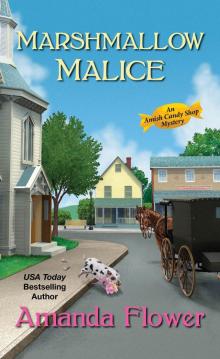 Marshmallow Malice
Marshmallow Malice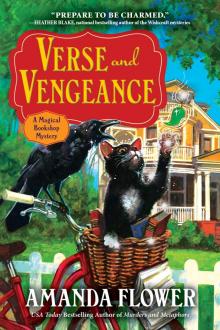 Verse and Vengeance
Verse and Vengeance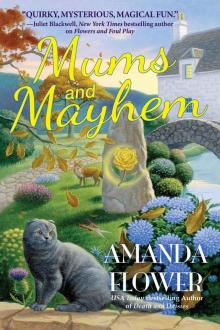 Mums and Mayhem
Mums and Mayhem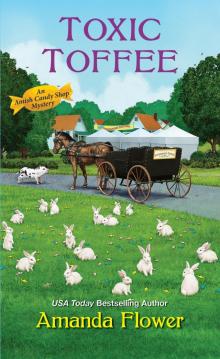 Toxic Toffee
Toxic Toffee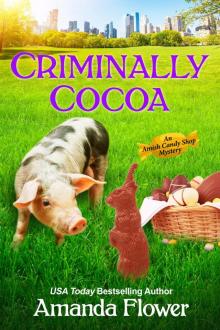 Criminally Cocoa
Criminally Cocoa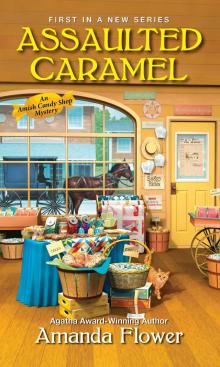 Assaulted Caramel
Assaulted Caramel Maid of Murder aihm-1
Maid of Murder aihm-1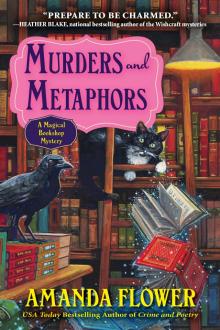 Murders and Metaphors
Murders and Metaphors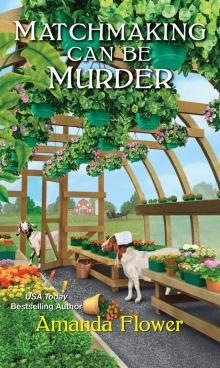 Matchmaking Can Be Murder
Matchmaking Can Be Murder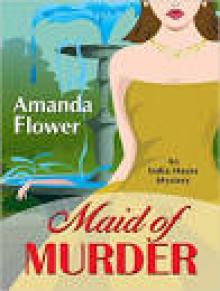 Maid of Murder (An India Hayes Mystery)
Maid of Murder (An India Hayes Mystery)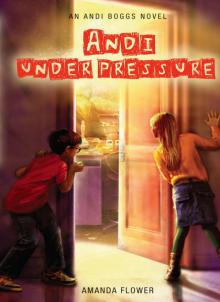 Andi Under Pressure
Andi Under Pressure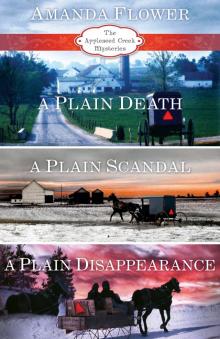 Appleseed Creek Trilogy, Books 1-3
Appleseed Creek Trilogy, Books 1-3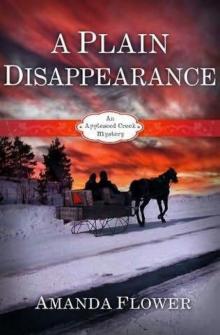 A Plain Disappearance
A Plain Disappearance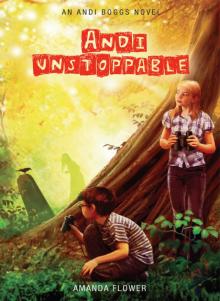 Andi Unstoppable
Andi Unstoppable The Final Vow
The Final Vow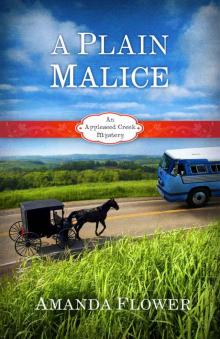 A Plain Malice: An Appleseed Creek Mystery (Appleseed Creek Mystery Series Book 4)
A Plain Malice: An Appleseed Creek Mystery (Appleseed Creek Mystery Series Book 4)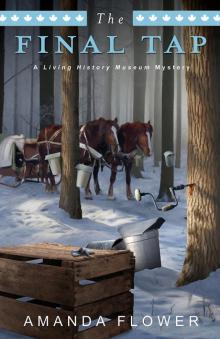 The Final Tap
The Final Tap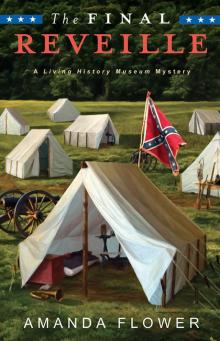 The Final Reveille: A Living History Museum Mystery
The Final Reveille: A Living History Museum Mystery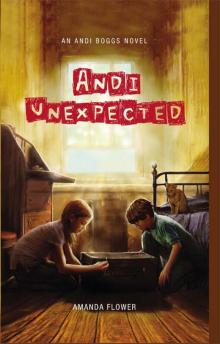 Andi Unexpected
Andi Unexpected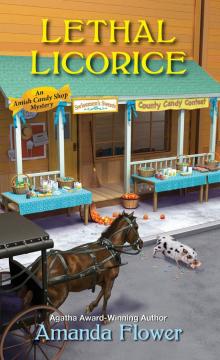 Lethal Licorice
Lethal Licorice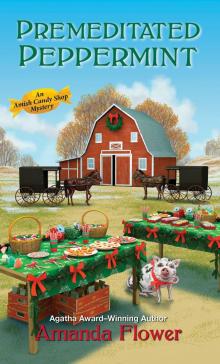 Premeditated Peppermint
Premeditated Peppermint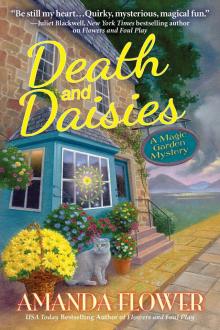 Death and Daisies
Death and Daisies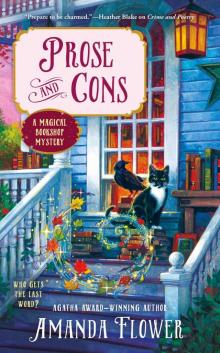 Prose and Cons
Prose and Cons